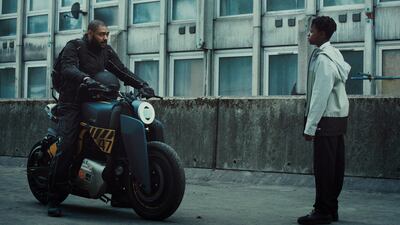Daniel Kaluuya, the Oscar-winning British actor from Get Out and Judas and the Black Messiah, goes behind the camera for the first time with The Kitchen, a gloomy dystopian drama.
Closing this year’s London Film Festival, the Netflix-backed film is visually arresting and politically angry, though sadly hampered by a flimsy narrative that near snaps by the third act.
Co-written by Kaluuya and Joe Murtagh, who previously scripted excellent Irish gangland story Calm With Horses, the film is set in a near-future London at a time when social housing has all but been eradicated. The titular Kitchen is a housing estate, packed with the poor and disenfranchised. A concrete and metal monstrosity, looking rather like the underground bunker seen in recent Apple TV+ show Silo, it’s like an urban shanty town, patrolled by police drones that buzz around the skies.
Among the occupants is Isaac (Kane Robinson, better known as Kano), or Izi, who has lived his whole life there. He works for Life After Life, a slick-looking funeral home, where he convinces the grief-stricken to buy packages, such as the Fond Farewell, for their dearly departed. All he wants is to do is make commission and move out of The Kitchen and into a plush, pristine-looking single-occupancy apartment, which has video displays on the windows to obscure the grimness outside.

At work, he meets 12-year-old Benji (Jedaiah Bannerman), a boy whose mother Toni has just died. Benji was told by his mother that his father came from The Kitchen, and he immediately attaches himself to Izi. Is Izi his father? It’s a question that lingers across the film, as the boy and this loner gradually bond. Soon, in one of the film’s major narrative contrivances, Benji finds himself adopted into a gang that ride bikes, rob stores and fire rocks from home-made slings at the drones. “You ain’t built like them,” Izi warns.
On the airwaves throughout is (the cleverly named) Lord Kitchener, a radio DJ who spins tracks and home truths for this community. Playing him is Ian Wright, the former Premier League footballer who made his career with Kaluuya’s beloved football club, Arsenal. Wright does a credible job as the voice of reason among the chaos, bringing to mind the DJ played by Samuel L Jackson in Spike Lee’s Do The Right Thing, one of several films that looms large over The Kitchen.
What works well in The Kitchen is the texture of the world that Kaluuya and his co-director Kibwe Tavares create. The rabbit-warren passageways filled with digital displays advertising fast foods and crypto money exchanges are evocatively designed. Same goes for the shot of The Kitchen featuring a bombed-out apartment, including a yawning black hole across the skyline. Kaluuya and former architect Tavares also make full use of the imposing Brutalist buildings that litter London.

Amid the grime, there are flashes of humour.
Like the annoying automated machine that Izi confronts when it fails to recognise his answers, when he then speaks louder, it chides him with, “No need to raise your voice.” Or Benji’s poor attempts to remember a few lines when Izi gets him a job at Life After Life.
Robinson, a rapper on the UK grime scene who’ll be familiar to fans of the show Top Boy, gives a low-key but charismatic turn as a man caught between making his escape and helping those around him, including Benji. Yet, as police forces relentlessly raid The Kitchen, the final third rather falls apart, lacking any real dramatic impact or cohesion.
The gang members that Benji sides with are poorly sketched, and his relationship with them is scarcely credible. Likewise, the film’s socio-political dynamic could’ve been much better conveyed; we rarely find out much about the society these characters exist in, beyond the fact the rich/poor divide has become a huge chasm.
The flaws may be glaring at times, but The Kitchen is still a film that brims with ambition.
The Kitchen premiered at the London Film Festival on October 15

